Revista Psicologia Organizações e Trabalho
ISSN 1984-6657
https://doi.org/10.17652/rpot/2016.4.12638
Empirical studies in WOP in Brazil: a paradigmatic analysis
Pesquisa empírica em POT no Brasil: uma análise paradigmática
La investigación empírica en POT en Brasil: un análisis paradigmático
Ariane Agnes CorradiI; Silvana Regina Ampessan MarconII; Elizabeth LoiolaIII; Lilia Aparecida KananIV; Laura Rodrigues VieiraI
IUniversidade Federal de Minas Gerais, Belo Horizonte, MG, Brasil
IIUniversidade de Caxias do Sul, Caxias do Sul, RS, Brasil
IIIUniversidade Federal da Bahia, Salvador, BA, Brasil
IVUniversidade do Planalto Catarinense, Lages, SC, Brasil
ABSTRACT
This paper presents a paradigmatic analysis of the literature in Work and Organizational Psychology produced in Brazil, based on Burrell and Morgan's model (1979). Five research themes were selected: learning, citizenship, justice, commitment, and socialization. In total, we analysed the paradigmatic orientations of 276 papers published in high-rank peer review Brazilian journals between 2004 and 2014. The functionalist or the interpretive paradigms predominate, but there are also inter-paradigmatic papers, which indicate the epistemological plurality in this field. More established themes show more paradigmatic diversity in comparison to recent themes. Burrell and Morgan's model was applicable to paradigmatic analysis of empirical studies in WOP; nevertheless, findings corroborate criticism of the assumption of exclusivity between paradigms. Future studies could explore trends in paradigmatic orientations in other themes and investigate the implications of this multi-paradigmatic perspective on knowledge production in WOP.
Keywords: paradigms; Work and Organizational Psychology; empirical research.
RESUMO
Este artigo apresenta uma análise paradigmática da literatura em Psicologia Organizacional e do Trabalho produzida no Brasil, baseada no modelo de Burrell e Morgan (1979). Cinco temas de pesquisa foram selecionados: aprendizagem, cidadania, justiça, comprometimento e socialização organizacional. Ao todo, foram investigadas as orientações paradigmáticas de 276 artigos publicados em periódicos brasileiros qualificados, entre 2004 e 2014. Observou-se a predominância do paradigma funcionalista ou do interpretativo, e a ocorrência de artigos interparadigmáticos, evidenciando pluralidade epistemológica no campo. Temas mais estabelecidos mostram mais diversidade paradigmática em comparação a temas recentes. O modelo de Burrell e Morgan mostrou-se aplicável a análises paradigmáticas de estudos empíricos em POT. Contudo, os resultados corroboram críticas ao pressuposto da exclusividade entre paradigmas. Estudos futuros poderiam explorar tendências nas orientações paradigmáticas em outros temas e investigar as implicações dessa perspectiva multiparadigmática na produção de conhecimento em POT.
Palavras-chave: paradigmas; Psicologia Organizacional e do Trabalho; pesquisa empírica.
RESUMEN
En este artículo se presenta un análisis paradigmático de la literatura en Psicología Organizacional y del Trabajo, producida en Brasil, basada en el modelo de Burrell y Morgan (1979). Se han seleccionado seis temas de investigación, a saber: aprendizaje, ciudadanía, justicia, comprometimiento y socialización. En total, se han investigado las orientaciones paradigmáticas de 276 artículos publicados en revistas brasileñas cualificadas entre 2004 y 2014. Los resultados han demostrado el predominio del paradigma funcionalista o interpretativo, y la ocurrencia de artículos interparadigmáticos, indicando la pluralidad epistemológica en el campo. Temas más establecidos en el área demuestran más diversidad paradigmática en comparación con temas recientes. El modelo de Burrell y Morgan demostró ser aplicable a los análisis paradigmáticos de los estudios empíricos de POT. Sin embargo, los resultados corroboran las críticas a la premisa de la exclusividad entre paradigmas. Estudios futuros podrían explorar tendencias en las orientaciones paradigmáticas en otros temas y, además, investigar las implicaciones de esa perspectiva multiparadigmática en la producción del conocimiento en POT.
Palabras-clave: paradigmas; Psicología Organizacional y del Trabajo; investigación empírica.
This article presents a paradigmatic analysis of the empirical research in Work and Organizational Psychology (WOP) in Brazil, in a selection of research topics, classifying it and discussing it based on the Burrell and Morgan model (1979). This model establishes that social theories can be divided into four quadrants, as detailed later. This paradigmatic analysis model had as a founding influence the work of Thomas Kuhn (2006/1962), which defines paradigms as a set of scientific habits that ensure successful solutions to problems, based on the concept of normal science. The models by Kuhn, and by Burrell and Morgan, became hegemonic in work assessing the scientific status of areas and subareas of knowledge production, across the world (Alvesson & Sandberg, 2013; Bendersky & McGinn, 2010; Hoque, Covaleski, & Gooneratne, 2013; Lucarelli & Brorström, 2013; Nonaka & Peltokorpi, 2006; Yazdani & Murad, 2015) and above all, recently in Brazil (Andion, 2012; Antunes, Soares, & Silva, 2013; Dias, Birochi, Deambrosis, Darosi, & Matos 2013; Silveira, 2013).
The wide dissemination of the four-paradigm model by Burrell and Morgan (1979), in particular, is not only due to the clarity and comprehensive literature review that single it out. Despite some discomfort caused by its philosophical dimensions and analyses, researchers skilled in approaches and methods other than those identified as mainstream felt recognized and legitimated by the classification scheme proposed by these authors, as well as those who were mainstream and were subjected to scathing criticism (Atkin, Hassard, & Cox, 2007; Bowers, 2011; Deetz, 1996; Morgan 1983).
In the context of the paradigmatic studies in WOP, in Brazil, there is the contribution of Bendassolli, Borges-Andrade and Malvezzi (2010) with a theoretical essay that classifies the Brazilian literature in four paradigms: positivist, post-positivist, critical, and clinical. However, there are no empirical studies on paradigms that permeate the production in WOP in Brazil. There are, however, literature reviews published since the 1990s, under different approaches (e.g., Bastos, França, Pinho, & Pereira, 1997; Tonelli, Caldas, Lacombe, & Tinoco, 2003; Tonetto, Amazarray, Koller, & Gomes, 2008). The first review to encompass both the themes of work and of organizations as a subarea of psychology was by Tonetto et al. (2008). These authors analyzed nine themes: organizational behavior, evaluation and measures; people management; work, identity, and subjectification; work and health; child labor; work and gender; work, violence, and social responsibility; professional training; and performance. Their results demonstrated the prolific development of research in the area, attributed, among other factors, to thematic and methodological diversity, the production of knowledge focused on the planning and implementation of interventions, and the theoretical development of WOP.
This thematic and methodological diversity and its contribution to knowledge production in WOP deserve attention from the paradigmatic point of view. Thus, this article takes the Burrell and Morgan model (1979) as the basis for classifying the empirical literature reviewed. So as not to neglect criticism of their model, however, critical studies on the production of knowledge in the areas of WOP selected (i.e., Goles & Hirschheim, 2000; Nonaka & Peltokorpi, 2006) were incorporated. A pluralized epistemological perspective of psychology (Abib, 2009) is also adopted. From this perspective, epistemological reflection considers that different psychological theories may belong to different scientific paradigms. Those, in turn, are constantly put to the test through research in which assumptions from those theories can be rejected.
From a Kuhnian perspective, Masterman (1970) argues that psychology is one of the multi-paradigmatic sciences, with subareas defined from its specific techniques, and with operational definitions discordant with one another, such that disagreements persist about their foundations. This paradigmatic multiplicity compromises long-term scientific progress (as opposed to local progress). Psychology is, therefore, plural (Abib, 2009) and multi-paradigmatic (Masterman, 1970) and, by extension, so is Work and Organizational Psychology (WOP). This study explores this plurality of a set of themes in WOP, in order to investigate paradigmatic guidelines that underlie the production of knowledge in it.
The Burrell and Morgan Model (1979)
The Burrell and Morgan (1979) concept of paradigm comprises a set of "meta-theoretical assumptions about the nature of social science and the nature of society" (p. 8). Paradigms are sources of problem areas, methods, and solution standards accepted by the scientific communities; they perform cognitive and normative functions that modulate scientific life (Kuhn, 2006/1962). While Kuhn presents many definitions of paradigms1 in The Structure of Scientific Revolutions, the constructivist critique by Masterman (1970) considers that these different definitions do not reveal inconsistencies of Kuhn's work, classifying it as philosophically obscure but scientifically clear. Masterman (1970) groups these definitions into three types: metaphysical paradigms or meta-paradigms (worldview), sociological paradigms (antecedents to theory), and artifact paradigms (less than a theory). Thus, Burrell and Morgan adopt the metaphysical perspective of paradigms present in Kuhn's work.
Burrell and Morgan (1979) combined the dimensions of nature of social sciences and nature of society into quadrants for the analysis of social theories. The first dimension defines the subjective-objective continuum of the nature of social sciences, based on four parameters: ontological, epistemological, human nature, and methodological (Figure 1).
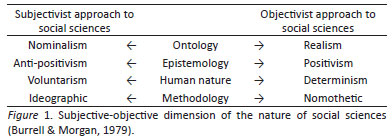
The ontological parameter is characterized by the debate between nominalism and realism. The nominalist position "revolves around the assumption that the social world external to individual cognition is made up of nothing more than names, concepts, and labels which are used to structure reality" (Burrell & Morgan, 1979, p. 4), therefore, the world is not made of real structures, but of the denominations or conventions that create this reality from human consciousness. The realistic position, in turn, "postulates that the social world external to individual cognition is a real world made of hard, tangible, and relatively immutable structures" (p. 4). These structures exist empirically, despite our perception.
The epistemological parameter is characterized by the debate between anti-positivism and positivism. Burrell and Morgan (1979) use the term positivist to designate epistemologies that "seek to explain and predict what happens in the social world by searching for regularities and causal relationships between its constituent elements" (p. 5). This position includes hypothesis testing and the assumption that knowledge grows cumulatively2. The anti-positivist position, in turn, includes various epistemologies that are set "against the utility of a search for laws or underlying regularities in the world of social affairs" (p. 5). Knowledge results from the frame of reference of a participant in action, therefore, knowledge about the social world is relative, considering a continuum from subjectivist relativism to a cultural and historical relativist perspective. These perspectives understand knowledge only from the individual point of view, not considering observation, for example, as an important technique for understanding phenomena because knowledge depends on the subject who is knowing.
As to the human nature parameter, the debate takes place between voluntarism and determinism. Between these extremes, there are intermediate positions, which take on the influence of situational and voluntary factors.
At one extreme we can identify a determinist view which regards man and his activities as being completely determined by the situation or 'environment' [including the biological environment] in which he is located. At another extreme, we can identify the voluntarist view that man is completely autonomous and free-willed (Burrell & Morgan, 1979, p. 6).
The last parameter, methodological, is characterized by the ideographic-nomothetic debate. The ideographic approach states that "one can only understand the social world by obtaining firsthand knowledge of the subject under investigation. It thus places considerable stress on getting close to one's subject and exploring its detailed background and life history" (Burrell & Morgan, 1979, p. 6). Research under this approach includes diaries, biographies, and journalistic records. The nomothetic approach, in turn, emphasizes the search for general relations, regularities, and laws to understand the object of study. This requires criteria for control of the method, leading to the systematic use of protocols and techniques to test research hypotheses, such as the construction of scientific tests, the use of questionnaires, and standardized research tools, as well as the use of quantitative data analysis techniques.
The second dimension elaborated by Burrell and Morgan (1979) refers to assumptions about the nature of society. Here, the authors claim that different theories tend to reflect particular views of social nature, according to the perspective of Dahrendorf (1959). On the one hand, there are the sociological approaches that explain the social nature through a concept of order and balance (sociology of regulation) and on the other, are those that are more concerned with change, conflict, and coercion of the social structure (sociology of radical change) (Table 1).
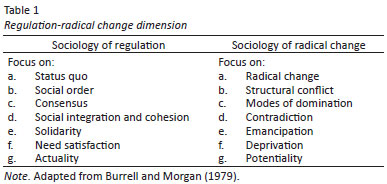
The combination of the two dimensions results in four sociological paradigms, defined as "meta-theoretical assumptions underlying the frame of reference, mode of theorizing, and modus operandi of the social theorists who operate within them" (Burrell & Morgan, 1979, p. 23). The paradigms are mutually exclusive, although they share a set of characteristics in one of the two dimensions and differ in relation to the other (Figure 2). Therefore, to accept the assumptions of one paradigm is to reject the assumptions of all the others.
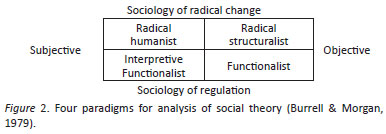
The Burrell and Morgan model (1979) became a classic in paradigmatic studies of social theories, prompting research and discussions, which led to the proliferation of criticism of the model (i.e., Bowers, 2011; Deetz, 1996). An important criticism is that this model served the purpose of reification of approaches. Another criticism refers to the impoverishment of discussion and analysis, since, due to the evolution of knowledge in the broader range of academic fields, this model fails to highlight differences between contemporary research guidelines (Deetz, 1996).
A further criticism is related to the incommensurability of the paradigms (Deetz, 1996). It either refers to the issue of the grand relativization of knowledge imposed by Kuhn's analyses on the structure and history of scientific theories, or is associated with the proliferation of different definitions for paradigm (Masterman, 1970). For Deetz (1996), what's more important is knowing whether the dimensions proposed by Burrell and Morgan (1979) allow for establishing differences between the research programs. For that author, the classificatory scheme by Burrell and Morgan is insufficiently radical, perpetuating the argument between objectivity (quantitative research) and subjectivity (qualitative research). That's because functionalist and humanistic psychologists, as much as Burrell and Morgan (1979), neglected the fact that the classification between objective and subjective is a social and historical construction, socially shared and, as such, subject to social conditions. Hence, the classificatory scheme by Burrell and Morgan (1979) reproduces a neo-positivist philosophy of science, obscuring other research programs.
In contrast to Deetz's view (1996), Goles and Hirschheim (2000) claim that the use of the Burrell and Morgan model (1979) in the information systems field has allowed them to show the absence of a unifying paradigm, despite the predominance of the functionalist paradigm, especially in the early days of this field. Revisiting the history of its formation, Goles and Hirschheim (2000) explain the predominance of the functionalist paradigm by the origin of its researchers, who have strong roots in areas of exact sciences and who seek recognition, respectability, and place their hopes on the social construction of their academic careers in an emerging field. In this context, it is not surprising that few paradigmatic variations have been observed. These authors argue that the predominance of a single paradigm is undesirable because it reduces the diversity of research approaches and cross-fertilization of opportunities.
Reviewing the 20 most cited articles in the area of knowledge management, Nonaka and Peltokorpi (2006) revisit the question of objectivity versus subjectivity. They classify the articles reviewed on a continuum whose extremes are objective and subjective. They argue that these publications differ from one another by their ontological concepts on the nature of the organizational phenomenon, by their epistemological concepts with regard to the nature of knowledge, and by their methodological approaches. They conclude that publications with economic approaches incorporate a positivist rationality, while those with interpretive approaches emphasize contextual and procedural aspects of knowledge management.
In Brazil, Lima (2011) points out the tendency for uncompromising use of a particular paradigm among scholars of the organizational phenomenon, which has resulted in reductionist approaches, in a renunciation of the complexity of organizational phenomena, and in an ontological void. Silveira (2013) discusses the influence of Burrell and Morgan's model (1979) on the development of organizational studies, especially in national graduate level programs in the 1980s and '90s. This author points out the suitability, still current, of the model for conducting analyses in organizational studies. An example of a Brazilian empirical study that was based on the Burrell and Morgan model (1979) was that by Dias et al. (2013), who conducted an analysis of Brazilian studies on strategy. They observed a high percentage of non-classifiable articles exclusively in one paradigm, and suggest the possibility of using multi-paradigmatic approaches in studies on strategy. This argument would invalidate the assumption of exclusivity in the Burrell and Morgan model.
In this article, therefore, given the evolution of WOP studies in the last 11 years, with increasing application of multi-method research designs that include methodological triangulation, we considered the possibility of alternative classifications (multi-paradigm or inter-paradigm approaches, according to Silveira, 2013) to the conceptual pairings established by Burrell and Morgan (1979). For example, studies including methodological triangulation can be located at the intersection between the functionalist and the interpretive paradigms. This implies not meeting the assumption of exclusivity between paradigms, leading to more in-depth discussions about the model and how WOP researchers have conceptualized their objects of study and forms of knowledge construction. Therefore, this article presents two specific objectives: (a) classify Brazilian studies in WOP according to the four paradigms of Burrell and Morgan (1979); and (b) discuss the assumption of exclusivity of paradigms, based on analysis of the Brazilian literature in a selection of psychological phenomena in work and in organizations.
Method
Since this is a paradigmatic analysis study of the Brazilian literature in WOP, the method prioritized the selection of a set of topics, published in qualified journals from 2004 to 2014. The themes selected for this study were: learning (including informal processes of individual learning, organizational learning, training, development, and education, in the classroom and distance modalities), commitment, socialization, organizational justice and citizenship. These themes were selected based on two criteria. The first blended different research traditions and their relevance in the area, such that learning represents a theme with a long tradition in WOP research in Brazil (Loiola & Bastos, 2003), organizational citizenship and justice represent more recent and prominent themes in national and international discussions in WOP (Palazolli, 2000; Rego, 2002; Rego, 2014; Siqueira, 2003; Tamayo et al., 2012), and socialization represents a topic that had a large increase in publications in the last decade (Borges & Albuquerque, 2014). These themes are among the fifteen most investigated in WOP in Brazil, with a total of more than 500 published articles (Mourão, Bastos, & Oliveira, 2016). The theme of learning at work was the most researched, followed by commitment, while the organizational citizenship theme occupied last place.
The second criterion was the familiarity of the authors with the literature on these topics, which enabled the paradigmatic analysis, particularly in relation to the articles whose paradigmatic positions were not explicit. This multi-thematic focus allows for a more comprehensive debate on paradigmatic positions that characterize the empirical research in WOP, and advances in relation to other paradigmatic studies (e.g., Andion, 2012; Karatas-Özkan & Murphy, 2010; Kakkuri-Knuuttila, Lukka, & Kuorikoski, 2008), which focus on just one topic.
Selection of articles
The selection of articles was based on journals indexed in the SciELO platform and /or classified in the Qualis-Journals system of the Coordination of Improvement of Higher Education Personnel (CAPES), Brazilian Ministry of Education. The productions are grouped into strata indicating quality, with A1 being the highest stratum; followed by A2; B1; B2; B3; B4; B5; and C, the stratum with a zero score. This study used articles from strata A1, A2, B1, and B2, in the 2014 ranking, in any of the areas: Psychology, Administration, and Education3. The selection of these areas considered two factors. The first refers to the existence, relatively recent, of journals specialized in WOP in Brazil, such as the Cadernos de Psicologia Social (Social Psychology Notebooks), launched in 1998 with the objective of disseminating scientific production in the area of work psychology and of organizational processes, based on the reading of social psychology as an interdisciplinary field; and the rPOT (Revista Psicologia: Organizações e Trabalho), launched in 2001 and focused on publishing original works, whether theoretical or empirical, relating to all the subareas of Work and Organizational Psychology. The second factor is the interdisciplinary character of this area of psychology, which promotes the publication of much of the research in journals from other knowledge areas.
The search used the keywords: learning, commitment, socialization, organizational justice, and organizational citizenship. The studies selected had to be empirical, have at least one Brazilian author, and to have been published between 2004 and 2014. This period of 11 years of publications allowed us to investigate different patterns of production by theme and by paradigm, resulting in an evolutionary framework of production on selected topics. Articles that did not present the underlying theory of the study, and descriptive case studies or interventions were excluded, since it was not possible to categorize them.
Organization of the data from the articles
The selected articles were listed in a spreadsheet, with one article per line, such that the essential text identification information (author, title, journal, volume, number) formed the columns. In subsequent columns, the encoding of each article by topic was placed. Thus, the number of subjects is greater than the number of articles, since some articles dealt with more than one of the themes of this study, e.g., socialization and learning, organizational justice and citizenship.
The columns after the encoding of topics indicated the basic theory of the study, the classification of the study with respect to ontology, epistemology, human nature, and methodology, following the paradigmatic dimensions of Burrell and Morgan (1979). The final column indicated the quadrant of the model in which each study was placed: functionalist, interpretive, radical humanist, and radical change, including the possibility of inter-paradigmatic ratings.
Article categorization procedures
In pairs, the authors categorized the selected articles, independently, according to the categories listed. Points of disagreement or doubt were first discussed by the pair itself and, when necessary, were further analyzed by at least one of the other co-authors. The main difficulty in classifying the paradigms was the non-explicit epistemic position of these articles' authors, which in some cases was inferred from a detailed analysis of the argument in the text and from the references list. It is noted that, in some cases, there was a mix of methods without clear reflections about the combination of different paradigms and antagonistic assumptions. These articles were classified as inter-paradigmatic.
A complementary procedure was the search for other articles by the same authors, in order to identify elements on the basic theories and epistemological orientation of their publications. This procedure was based on the assumption that authors will guide their scientific production based on a main paradigm, it being unlikely they would change their paradigmatic position between one scientific production and another, at least within the period analyzed. This procedure proved effective in several cases of doubt.
As discussed in the theoretical framework, the possibility of finding inter-paradigmatic positions was considered. To identify them, it was essential to classify each of the four dimensions of the paradigmatic model, rather than classify only the quadrant. This strategy made it possible, during the categorization process, to analyze studies of mixed methods, for example, in-depth. In such cases, we had to be careful to assess in detail the entire content of the article, so that the simple use of mixed methods was not enough to place the study in an inter-paradigmatic position. A detailed assessment of these articles sought to identify whether one paradigmatic perspective overlapped the others, so that the others were secondary. Where an effectively intermediate position was identified, more than one paradigmatic category was adopted. In the remaining cases, the predominant quadrant in the study was adopted.
Systematization of the paradigmatic analysis
After this step, we proceeded to general and comparative analyses (publication period, journal, guiding theory...), considering the total number of articles selected, the distribution of articles by paradigm, and analyses by topic. As the learning theme represents 60.4% of the articles selected (180 in 298), it is important to consider that the overall results are strongly influenced by the characteristics of the publications on this topic.
Results
The first results present an overview, without distinction between themes. From a total of 49 journals, 1,282 articles were identified that contained at least one of the themes of this study. Of this total, 276 articles were selected for analysis. Table 2 shows the distribution of these articles by journal classification. As the table is organized by themes, the number of articles totals 298, since the same article may contain more than one theme, and be counted more than once. It is observed that the predominant theme across the total of publications found was learning. When the proportions were analyzed, it was found that the justice/citizenship and commitment themes had a higher number of articles selected than learning had.
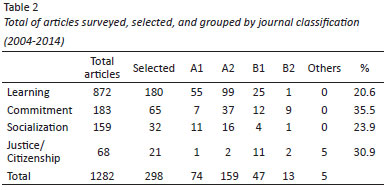
Table 3 shows the journals in which at least five articles were found in the period under analysis. Note that most of these journals are found in the areas of Education or Administration, highlighting Ciência & Educação,RAM (Revista de Administração Mackenzie), and RAC (Revista de Administração Contemporânea), averaging two articles per year in the period analyzed. The rPOT is in 3rd place in the table. In addition, we note the large number of journals in which less than five articles are found (19 of them with one article only, including the journal Cadernos de Psicologia Social), which suggests that many studies on these themes have found publication spaces in journals of related fields.
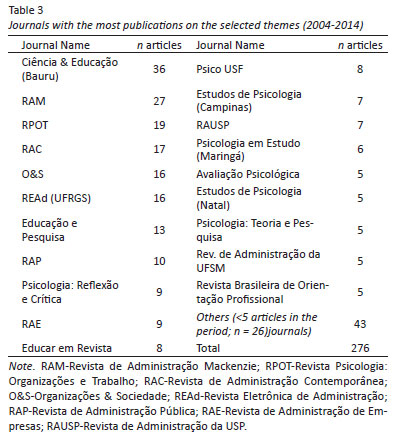
From this brief characterization of the sample of articles, the overall results of categorization based on the paradigmatic matrix of Burrell and Morgan (1979) are presented. In Table 4, the predominance of the functionalist paradigm is observed, corresponding to 56.16% of the total (n=155 articles), followed by the interpretive paradigm (n=93 articles), corresponding to 33.7% of the total. Together, these two paradigms account for 90% of the articles analyzed, indicating that the epistemic position of these studies is concentrated on the axis of regulation of society, that is, they adopt forms of knowing the world that emphasize order and regularity. In third place are the studies with a radical humanist orientation (4.71% of the total), most of which embrace the theory of Paulo Freire, i.e., do not contemplate psychological theory.
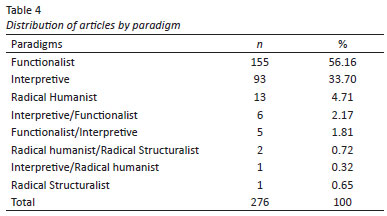
Of the remaining articles, 9 were classified as inter-paradigmatic. It is important to clarify that the functionalist/interpretive and interpretive/functionalist categories are not equivalent. The first category of each pair is the most prominent in the study, i.e., functionalist/interpretive refers to articles with a functionalist orientation, which include, in the background, contributions of theories and/or methods that are supported by nomothetic and ideographic epistemological approaches. While these 9 articles represent only 3.25% of the total, they also provide evidence that the quadrants defined by Burrell and Morgan (1979) are not mutually exclusive, even though most of the studies fit into one paradigm or another. These inter-paradigmatic studies combine theories located in different paradigms, as well as make use of multiple research methods.
Results by themes
This results section presents the paradigmatic analyses for each theme, starting with the topics most studied, in the following sequence: learning, commitment, socialization, and justice & citizenship. The results are presented for the sum total of articles from 2004 to 2014, and for three year intervals (the last being two years), in order to identify trends in the paradigmatic orientations during this period.
Regarding learning, Table 5 shows a certain balance between the functionalist and interpretive paradigms over the intervals analyzed and in the total number of articles published from 2004 to 2014. The articles classified in these two paradigms represent 86.1% of the total reviewed texts, revealing that these paradigms are both competing and hegemonic in the field. The radical humanist paradigm also appears, in 13 of the 180 articles of this sample, representing 7%. This result is due largely to the inclusion of journals from the Education area, which contain many studies of a Freirian orientation, with the use of ideographic methods.
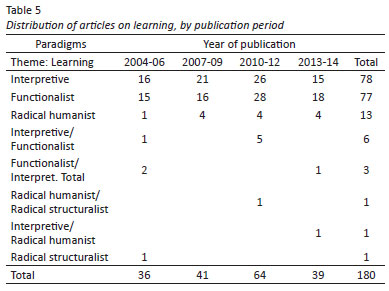
The most frequent theories, by paradigm, that support such studies are:
• Functionalist paradigm: cognitive-behavioral approach, models of learning and training (Kolb, Kirkpatrick, Hamblin, Mayer, Davis and Bloom);
• Interpretive paradigm: cognitive constructivism (Ausubel, Piaget), socio-interactionist theory (Vygotsky), activity theory (Leontiev), situated learning and communities of practice (Lave, Wenger), and psychoanalytical approaches;
• Radical humanist: education as emancipation (Adorno) and dialogical-emancipatory education (Freire). In these cases, while not adopting psychological theories, the studies bring contributions applicable to organizational contexts, and therefore were included in the analysis;
• Among the articles classified in the interface between the functionalist and interpretive paradigms, theorizing is observed in distance education (Meister), learning networks (Powell, Hardy), and the use of the multi-criteria decision aid - constructivist (MCDA-C) methodology.
With regard to commitment, the results showed that studies with a functionalist paradigmatic orientation predominate, with 86.6% of the total articles on this topic. This predominance tends to be stable in the time intervals analyzed. The most frequent theoretical orientations are within a cognitivist approach, with authors such as Meyer and Allen and Bastos as the most cited.
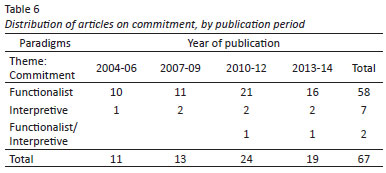
A different pattern was observed in relation to socialization articles (Table 7). In this theme, a certain balance was found between functionalist and interpretive articles over the period analyzed. However, unlike what happens with learning, in socialization a high incidence was observed of articles that do not specify their basic theory (five articles, or 16.6%) or whose theories do not include psychological theories (four articles, 13.3%), totaling 29.9% of these studies. Among the psychological approaches, social psychology predominates.
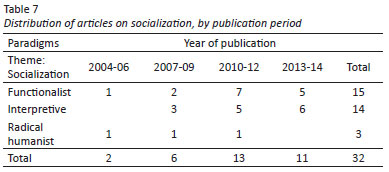
Regarding organizational justice and citizenship, the last theme studied, the results show a pattern similar to that of commitment, with a predominance of the functionalist paradigm in the periods analyzed, representing 81% of the total articles on this theme (Table 8). There are no authors of reference on these themes, with a wide range of approaches in the 21 articles analyzed. Despite the small number of articles, greater variability of paradigms is observed in the periods with a higher number of publications. This suggests that, although there is a predominance of the functionalist paradigm, one must avoid generalizations that automatically exclude other paradigms.
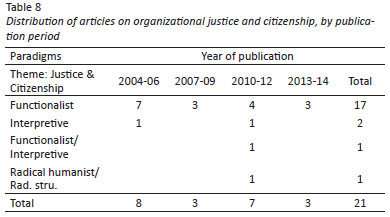
Discussion
The paradigmatic analysis of the themes selected for this study showed that there is much variability between the areas. Although the general tendency is toward functionalist studies, there is diversity in relation to theories within this paradigm and in the predominance of this paradigm among the themes. The more mature fields of research (learning, socialization, and commitment) show important traits: the first two are more permeated by different paradigms and with an almost equal presence of the functionalist and interpretive paradigms. The articles about commitment and organizational citizenship show a marked leadership of functionalism and interpretivism. In the case of the latter, which represents the most recent theme in the set studied, this predominance can be explained by the researchers' need to establish themselves in the field (Goles & Hirschheim, 2000). These results indicate that scientific production on these themes still follows the premises of the modern science project, based on positivism and on post-positivism (Guba & Lincoln, 1994).
The risk that is assumed with a scientific production predominantly driven by the functionalist paradigm is that of generating and disseminating theories with partial and simplistic explanations of organizational phenomena, which relegate to the background the individual interpretations of these phenomena, as well as the relations of power and the socially constructed dimensions, which could contribute to broader theories to explain organizational phenomena (Guba & Lincoln, 1994; Lewis & Grimes, 2005).
Another important result is the existence of inter-paradigmatic studies providing empirical evidence that one of the central assumptions of the Burrell and Morgan model does not hold for the Brazilian scientific production analyzed. However, it can be argued that the model, in general, is valid for conducting paradigmatic analyses, given that most of the studies fit into one paradigm or another. Thus, a revision of the assumption of exclusivity between paradigms is proposed, replacing it with an inter-paradigmatic perspective.
The literature on inter-paradigmatic research can be referenced from Morgan's work (1983), which states that, by means of inter-paradigmatic dialogues, theorists from different paradigmatic orientations can expose the assumptions underlying their theoretical and methodological choices, and thus can deepen understanding about the contributions and limitations of their theoretical approach and of those originating from alternative paradigms.
Beyond the inter-paradigmatic dialogues, authors such as Lewis and Grimes (2005) systematized three models of multi-paradigmatic investigation: multi-paradigmatic reviews, multi-paradigmatic research, and multi-paradigmatic construction of theories (meta-theorizing). Another approach to develop theories based on multiple paradigms is based on the concept of theoretical triangulation or theoretical pluralism (Hoque et al., 2013), which has been used in studies in the area of administration to expand the construction of knowledge of a functionalist orientation, also predominant in this knowledge area quite close to organizational psychology.
An example of a multi-paradigmatic approach in studies on organizational learning is found in Karatas-Özkan and Murphy (2010). The authors, based on reflections about key aspects of the critical theory, post-modernist, and social-constructivist paradigms, postulate that the use of these alternative paradigms can foster the emergence of insights, given the multifaceted and complex nature that the organizational learning phenomenon has come to present in recent times. These authors emphasize the need to understand and examine alternative perspectives for the analysis of organizational phenomena and to stimulate debate focused on emerging approaches.
This study analyzed the empirical production of a selection of themes (learning, organizational commitment, socialization, organizational justice and organizational citizenship) of WOP research in Brazil, based on the paradigmatic model of Burrell and Morgan (1979). It also questioned the assumption of exclusivity between paradigms, in view of the criticism found in the literature and the empirical data observed. It is noteworthy that the main challenge to achieving these objectives was the lack of clarity on the epistemic positions in the empirical studies selected. This lack of clarity can be credited to two main factors. One is the formatting of the articles, linked to the publication standards of the journals, which do not require or leave room for these epistemological positions. Another factor is the lack of clarity by the authors themselves about their epistemological positions, which can be supported by socialization processes within certain scientific communities, without reflections about their meta-theoretical perspectives (Burrell & Morgan, 1979).
After the problems of categorization were overcome, the results provided empirical evidence to support the argument that the WOP is a multi-paradigmatic area (Abib, 2009; Masterman, 1970), both through the number of studies driven by different paradigms, and through the existence of studies that combine different paradigms. However, the lack of clarity about the epistemological positions in many studies may lead to the supposition that some of this multi-paradigmatism is explained by the sociological meaning of paradigm, rather than by a meta-paradigmatic perspective (Masterman, 1970), as the model by Burrell and Morgan assumes. Thus, inter- and multi-paradigmatic studies can stem from the notion of paradigm as a set of scientific habits, based on past concrete achievements of a given scientific community rather than based on abstract achievements (Masterman, 1970). Therefore, this study helps to open a broader epistemological discussion about the paradigmatic orientations of the empirical studies in WOP, based on the themes selected.
In this multi-paradigmatic perspective, the presence of inter-paradigmatic studies provide theoretical support for criticism of the Burrell and Morgan model (1979) in relation to the assumption of exclusivity between the paradigmatic quadrants, as demonstrated by Dias et al. (2013) in their study about Brazilian research on strategy. Thus, we suggest a revision of the model, so that it moves away from this traditional view of classification (Deetz, 1996) and incorporates the possibility of interfaces between the paradigms, considering that Thomas Kuhn himself acknowledged the polysemy fixed within the term paradigm, suggesting its replacement by a disciplinary matrix (Silva, 2000).
Thus, this study contributes a broad set of evidence on the need for a revision of the paradigm concept, given its centrality in the model under discussion. This revision requires, in addition, a greater effort at defining this concept, considering a broader literature on philosophy of science and the metaphysical, sociological, and artifact-related notions of paradigms (Masterman, 1970). This effort, since it takes into account current scientific developments as indicative clues of different types of paradigms, can result in new paradigmatic categories, or alternatively, in the elaboration of another replacement concept.
As to limitations, one is the small number of themes, which does not allow generalizations to WOP as a whole. Other limitations are imposed by the lack of clarity of many studies about their theoretical basis, epistemological position, and combination between methods. Thus, future studies could compare different areas within WOP, in order to compose a body of knowledge that is more representative of the diversity of themes that compose it.
References
Abib, J. A. D. (2009). Epistemologia pluralizada e história da psicologia. Scientiae Studia, 7(2),195-208. [ Links ]
Alvesson, M., & Sandberg, J. (2013). Has management studies lost its way? Ideas for more imaginative and innovative research. Journal of Management Studies, 50(1),128-152. doi: 10.1111/j.1467-6486.2012.01070.x [ Links ]
Andion, C. (2012). Por uma nova interpretação das mudanças de paradigma na administração pública. Cadernos EBAPE.BR, 10(1),1-19. [ Links ]
Antunes, M. H., Soares, D. H. P., & Silva, N. (2013). Aposentadoria e contexto familiar: Um estudo sobre as orientações teóricas da produção científica. Perspectivas em Gestão & Conhecimento, 3(Número Especial),45-56. [ Links ]
Atkin, I., Hassard, J., & Cox, J. W. (2007). Excess and mimesis in organization theory: Emancipation from within? Culture and Organization, 13(2),145-156. doi: 10.1080/14759550701299883. [ Links ]
Bastos, A. V. B., França, A., Pinho, A. P. M., & Pereira, L. (1997). Pesquisa em comportamento organizacional no Brasil: O que foi divulgado nos nossos periódicos científicos? Anais do XXVI Congresso Interamericano de Psicologia. São Paulo: Pontifícia Universidade Católica de São Paulo. [ Links ]
Bendassolli, P. F., Borges-Andrade, J. E., & Malvezzi, S. (2010). Paradigmas, eixos temáticos e tensões na PTO no Brasil. Estudos de Psicologia (Natal), 15(3),281-289. doi: 10.1590/S1413-294X2010000300008 [ Links ]
Bendersky, C., & McGinn, K. L. (2010). Perspective-open to negotiation: Phenomenological assumptions and knowledge dissemination. Organization Science, 21(3),781-797. doi: 10.1287/orsc.1090.0487 [ Links ]
Borges, L. O., & Albuquerque, F. J. B. (2014). Socialização organizacional. In J. C. Zanelli, J. E. Borges-Andrade & A. V. B. Bastos (Orgs.), Psicologia, organizações e trabalho no Brasil (2a ed., pp. 351-384). Porto Alegre: Artmed. [ Links ]
Bowers, T. D. (2011). Towards a framework for multiparadigm multimethodologies. Systems Research and Behavioral Science, 28(5),537-552. doi: 10.1002/sres.1120 [ Links ]
Burrell, G., & Morgan, G. (1979). Sociological paradigms and organisational analysis: Elements of the sociology of corporate life. United Kingdom: Heinemann Educational Books. [ Links ]
Dahrendorf, R. (1959). Class and class conflict in industrial society. London: Routledge and Kegan Paul. [ Links ]
Deetz, S. (1996). Describing differences in approaches to organization science: Rethinking Burrell and Morgan and their legacy. Organization Science, 7(2),191-207. doi.org/10.1287/orsc.7.2.191 [ Links ]
Dias, T., Birochi, R., Deambrosis, A. M., Darosi, G. C. M., & Matos, O. A. (2013). A construção do conhecimento sobre estratégia: Uma análise da produção científica recente (2003-2011), na perspectiva de Burrell e Morgan. Anais do IV Encontro de Ensino e Pesquisa em Administração e Contabilidade. Brasília: ANPAD. Recuperado de http://www.anpad.org.br/diversos/trabalhos/EnEPQ/enepq_2013/2013_EnEPQ128.pdf [ Links ]
Goles, T., & Hirschheim, R. (2000). The paradigm is dead, the paradigm is dead... long live the paradigm: The legacy of Burrell and Morgan. The International Journal of management Science (Omega), 28(3),249-268. doi: http://dx.doi.org/10.1016/S0305-0483(99)00042-0 [ Links ]
Guba, E. G., & Lincoln, Y. S. (1994). Competing paradigms in qualitative research. In N. K. Denzin & Y. S. Lincoln (Eds.), Handbook of qualitative research (pp. 105-107). Thousand Oaks: Sage. [ Links ]
Hoque, Z., Covaleski, M. A., & Gooneratne, T. N. (2013). Theoretical triangulation and pluralism in research methods in organizational and accounting research. Accounting, Auditing & Accountability Journal, 26(7),1170-1198. doi: http://dx.doi.org/10.1108/AAAJ-May-2012-01024 [ Links ]
Kakkuri-Knuuttila, M., Lukka, K., & Kuorikoski, J. (2008). Straddling between paradigms: A naturalistic philosophical case study on interpretive research in management accounting. Accounting, Organizations and Society, 33(2-3),267-291. doi: http://dx.doi.org/10.1016/j.aos.2006.12.003 [ Links ]
Karatas-Özkan, M., & Murphy, W. D. (2010). Critical theorist, postmodernist and social constructionist paradigms in organizational analysis: A paradigmatic review of organizational learning literature. International Journal of ManagementReviews, 12(4),453-465. doi: 10.1111/j.1468-2370.2009.00273.x [ Links ]
Kuhn, T. (2006/1962). A estrutura das revoluções científicas (B. V. Boeira & N. Boeira, Trads., 9a ed.). São Paulo: Perspectiva. [ Links ]
Lewis, M. W., & Grimes, A. J. (2005). Metatriangulação: A construção de teorias a partir de múltiplos paradigmas. Revista de Administração de Empresas, 45(1),72-91. [ Links ]
Lima, L. A. (2011). A representação das múltiplas dimensões paradigmáticas no estudo da administração: Um ensaio sobre os limites contidos nas defesas paradigmáticas excludentes. Revista de Administração Contemporânea, 15(2),199-208. doi: http://dx.doi.org/10.1590/S1415-65552011000200003 [ Links ]
Loiola, E., & Bastos, A. V. B. (2003). A produção acadêmica sobre aprendizagem organizacional no Brasil. Revista de Administração Contemporânea, 7(3),181-201. doi: http://dx.doi.org/10.1590/S1415-65552003000300010 [ Links ]
Lucarelli, A., & Brorström, S. (2013). Problematising place branding research: A meta-theoretical analysis of the literature. The Marketing Review, 13(1),65-81. doi: http://dx.doi.org/10.1362/146934713X13590250137826 [ Links ]
Masterman, M. (1970). The nature of a paradigm. In I. Lakatos & A. Musgrave (Eds.), Criticism and the growth of knowledge (pp. 59-89). Cambridge:
Cambridge University Press. Morgan, G. (1983). Beyond method: Strategies for social research. Newbury Park: Sage. [ Links ]
Mourão, L., Bastos, A. V. B., & Oliveira, R. P. (2016). The Saying and the Doing in research on WOP. Revista Psicologia: Organizações e Trabalho, 16(4),333-339. doi: 10.17652/rpot/2016.4.12575 [ Links ]
Nonaka, I., & Peltokorpi, V. (2006). Objectivity and subjectivity in knowledge management: A review of 20 top articles. Knowledge and Process Management, 13(2),73-82. doi: 10.1002/kpm.251. [ Links ]
Palazolli, F. (2000). Percepção de justiça nas organizações como antecedente dos comportamentos de cidadania organizacional. Caderno de Pesquisa em Administração, 7(3),1-12. [ Links ]
Rego, A. (2002). Climas éticos e comportamentos de cidadania organizacional. Revista de Administração de Empresas, 42(1),1-14. doi: http://dx.doi.org/10.1590/S0034-75902002000100006 [ Links ]
Rego, A. (2014). Comportamentos de cidadania organizacional: Operacionalização de um constructo. Psicologia, 13(1/2),127-148. doi: http://dx.doi.org/10.17575/rpsicol.v13i1/2.563 [ Links ]
Silva, A. P. (2000). Alguns tópicos sobre a estrutura das revoluções científicas de Thomas S. Kuhn. Revista Administração em Dialógo, 2(1),1-11. [ Links ]
Silveira, R. Z. (2013). Mãe!? O mundo vai acabar...? Reflexões sobre desdobramentos e implicações dos paradigmas sociológicos de Burrell e Morgan para os estudos organizacionais. Cadernos EBAPE.BR, 11(4),652-670. doi: 10.1590/s1679-39512013000400012. [ Links ]
Siqueira, M. M. M. (2003). Proposição e análise de um modelo para comportamentos de cidadania organizacional. Revista de Administração Contemporânea, 7(spe),165-184. doi: http://dx.doi.org/10.1590/S1415-65552003000500009 [ Links ]
Tamayo, Á., Moniz, A. L., Oliveira, V., Carvalho, R. S., Macedo, S., Armando, P., & Guimarães, F. T. (2012). Prioridades axiológicas, tempo de serviço e cidadania organizacional. Psicologia: Teoria e pesquisa, 14(1),35-40. [ Links ]
Tonelli, M. J., Caldas, M. P., Lacombe, B. M. B., & Tinoco, T. (2003). Produção acadêmica em recursos humanos no Brasil: 1991-2000. Revista de Administração de Empresas, 43(1),105-122. doi: http://dx.doi.org/10.1590/S0034-75902003000100011 [ Links ]
Tonetto, A. M., Amazarray, M. R., Koller, S. H., & Gomes, W. B. (2008). Psicologia organizacional e do trabalho no Brasil: Desenvolvimento científico contemporâneo. Psicologia & Sociedade, 20(2),165-173. doi: http://dx.doi.org/10.1590/S0102-71822008000200003 [ Links ]
Yazdani, N., & Murad, H. S. (2015). Toward an ethical theory of organizing. Journal of Business Ethics, 127(2),399-417. doi: 10.1007/s10551-014-2049-3 [ Links ]
 Endereço para correspondência:
Endereço para correspondência:
Ariane Agnes Corradi
Universidade Federal de Minas Gerais, Faculdade de Filosofia e Ciências Humanas, Departamento de Psicologia
Pampulha
Belo Horizonte, MG, Brasil 31270-901
Email: acorradi@ufmg.br
Recebido em: 14/07/2016
Primeira decisão editorial em: 26/08/2016
Versão final em: 02/09/2016
Aceito em: 06/09/2016
1 Aware of the evolution of knowledge and criticism received, Kuhn bows to the polysemy of the term paradigm and suggests its replacement by a disciplinary matrix in the 1997 edition of The Structure of Scientific Revolutions (Silva, 2000).
2 This does not imply confusing positivism with empiricism, which works from the premise that knowledge is only possible through the observation of actual facts.
3 For the journals classified in more than one of these areas, the highest classification, independent of assessment area, was adopted.














